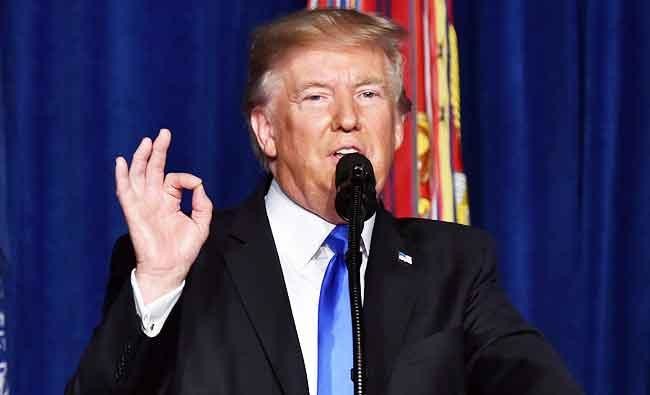WASHINGTON: President Donald Trump opened the door on Monday night to an increase in US troops in Afghanistan as part of a retooled strategy for the region, overcoming his own doubts about America’s longest war and vowing “a fight to win.”
Trump, in a prime-time televised address at a military base near Washington, said his new approach was aimed at preventing Afghanistan from becoming a safe haven for Islamist militants bent on attacking the United States.
The Republican president, who has repeatedly criticized the Afghanistan strategies of his predecessors, now inherits the same challenges, including a resurgent Taliban and a weak government in Kabul. He is laying the groundwork for greater US involvement without a clear end in sight or providing specific benchmarks for success.
In a speech with few details, Trump did not specify how many more troops would be added, gave no timeline for ending the US presence in Afghanistan, and put pressure on Pakistan, India and NATO allies to step up their own commitment.
But officials said he had signed off on Defense Secretary James Mattis’ plans to send about 4,000 more to add to the 8,400 now deployed in Afghanistan.
He warned US support was not open-ended — “our support is not a blank check” — and insisted he would not engage in “nation-building,” a practice he has accused his predecessors of doing at huge cost.
“We are not nation-building. We are killing terrorists,” he said.
Trump laid out a tougher approach to US policy toward Pakistan. Senior US officials warned he could reduce security assistance for Pakistan unless the nuclear-armed nation cooperates more in preventing militants from using safe havens on its soil.
“We can no longer be silent about Pakistan’s safe havens,” Trump said. “Pakistan has much to gain from partnering with our effort in Afghanistan. It has much to lose by continuing to harbor terrorists.”
A Pakistani army spokesman said on Monday that Pakistan had taken action against all Islamist militants including the Haqqani network, which is allied to Afghan Taliban insurgents.
“There are no terrorist hideouts in Pakistan. We have operated against all terrorists, including (the) Haqqani network,” spokesman Major General Asif Ghafoor told a media briefing in Islamabad.
Trump expanded the US military’s authority for American armed forces to target militant and criminal networks. He said that US enemies in Afghanistan “need to know they have nowhere to hide — that no place is beyond the reach of American arms.”
“Our troops will fight to win,” he added.
A US-led coalition invaded Afghanistan and overthrew the Islamist Taliban government for harboring Al-Qaeda militants who plotted the Sept. 11 attacks. But US forces have remained bogged down there through the presidencies of Republican George W. Bush, Democrat Barack Obama and now Trump. About 2,400 US forces have died in Afghanistan since the invasion.
PAST SKEPTICISM
The speech came after a months-long review of US policy in which Trump frequently tangled with his top advisers on the future of US involvement in Afghanistan, where Taliban insurgents have been making territorial gains.
US military and intelligence officials are concerned that a Taliban victory over Afghan President Ashraf Ghani’s government would allow Al-Qaeda and Islamic State’s regional affiliate to establish bases in Afghanistan from which to plot attacks against the United States and its allies.
“The unfortunate truth is that this strategy is long overdue and in the interim the Taliban has made dangerous inroads,” said senior Republican Senator John McCain, chairman of the Senate Armed Services Committee.
The Republican president overcame his own skepticism about the war that began in October 2001 after the Sept. 11 attacks on the United States. He said repeatedly on the campaign trail last year that the war was too costly in lives and money.
“My original instinct was to pull out,” he said in his speech, but added he was convinced by his national security advisers to strengthen the US ability to prevent the Taliban from ousting the US-backed government in Kabul.
Trump’s speech came as the president tries to rebound after he was engulfed in controversy for saying both sides were to blame for violence between white supremacists and counter-protesters in Charlottesville, Virginia, earlier this month.
In an allusion to the Charlottesville uproar, Trump said: “We cannot remain a force for peace in the world if we are not at peace with each other.”
Trump also said the United States wanted India to help more with Afghanistan, especially in the areas of economic assistance and development.
He made clear his patience had limits in support of the Afghanistan government, saying Kabul needed to increase its cooperation in order to justify a continued American commitment.
Trump said it could be possible to have a political settlement with elements of the Taliban.
“But nobody knows if or when that will ever happen,” he said.
US commanders have long planned for a possible shift in resources from Iraq to Afghanistan as the fight against Islamic State comes off its peak, following gains made in the Iraqi city of Mosul and other areas.
One reason the White House decision took so long, two officials who participated in the discussions said on Sunday, is that it was difficult to get Trump to accept the need for a broader regional strategy that included US policy toward Pakistan.
Trump received a wide range of conflicting options, the officials said.
White House national security adviser H.R. McMaster and other advisers favored accepting a request for an 4,000 additional US forces.
But recently ousted White House strategic adviser Steve Bannon had argued for the withdrawal of all US forces, saying the war was still not winnable, US officials said. Bannon was fired on Friday by Trump.
The US intervention in Afghanistan: key developments
Below are developments in the US military presence in Afghanistan, as President Donald Trump unveiled Monday his new strategy for the country and cleared the way to send thousands more US troops there.
Currently 8,400 American soldiers are taking part in NATO’s operation in Afghanistan, which comprises a total of 13,000 troops in all. Most of them are charged with overseeing and training Afghan forces.
• On October 7, 2001, less than a month after the September 11 attacks, US president George W. Bush launches operation “Enduring Freedom” in Afghanistan, after the Taliban regime refuses to hand over Al-Qaeda chief Osama Bin Laden.
In a matter of weeks the US-led forces overthrow the Taliban, in power since 1996.
Apart from air strikes, the US backs the Afghan Northern Alliance, which is fighting the Taliban, contributing paramilitary teams from the CIA and special forces.
Some 1,000 American soldiers are deployed on the ground in November, rising to 10,000 the year after.
• Attention is diverted from Afghanistan as US forces in 2003 mount an invasion of Iraq, which becomes the main US concern.
The Taliban and other Islamist groups regroup in their strongholds in the south and east of Afghanistan, from where they can easily travel to and from Pakistani tribal zones.
In 2008 the American command on the ground calls for manpower to carry out an effective strategy against the Taliban insurgency. Bush agrees to send additional soldiers and by mid-2008 there are 48,500 US troops there.
• In 2009, in the first months of the presidency of Barack Obama — elected on campaign promises to end the two wars in Iraq and Afghanistan — there is a surge in the number of American soldiers in Afghanistan to around 68,000.
In December, Obama raises the strength of US forces in Afghanistan to around 100,000.
The objective is to put brakes on the Taliban and to strengthen Afghan institutions.
• Al-Qaeda leader Bin Laden, mastermind of the 9/11 attacks that started the war, is killed on May 2, 2011 during an operation by US special forces in Pakistan, where he is in hiding.
• In September 2014 Afghanistan signs a bilateral security accord with the US and a similar text with NATO: 12,500 foreign soldiers, of which 9,800 are Americans, will remain in the country in 2015, after the end of the NATO combat mission at the end of 2014.
From the beginning of 2015, American troops will be charged with two missions: anti-terrorist operations against Al-Qaeda and the training of Afghan forces.
In late December, the NATO combat mission ends, and is replaced by an assistance mission baptized “Resolute Support.”
However, the security situation degenerates.
Amid a resurgent Taliban, on July 6, 2016, Obama again slows down the pace of withdrawal, saying that 8,400 US troops will remain in Afghanistan into 2017.
• On October 3, 2015, at the height of combat between Islamist insurgents and the Afghan army, backed by NATO special forces, a US airstrike bombs a hospital run by Medecins Sans Frontiers (Doctors Without Borders) in northern Kunduz province, killing 42, including 24 patients and 14 members of the NGO.
• On April 13, 2017, the US military drops the largest non-nuclear bomb it has ever used in combat, hitting Islamic State positions in a network of tunnels and caves in the east, killing 96 jihadists.
In July, the American army kills the IS’s new leader in Afghanistan, the third such chief slain by Washington and Kabul.
• On February 1, 2017 a US government report says that losses of Afghan security forces have climbed by 35 percent in 2016 compared with the previous year.
On February 9, the US general in command of the NATO force, General John Nicholson, warns that he needs thousands more troops, telling Congress: “I believe we’re in a stalemate.”
On August 21 Trump cleared the way for the deployment of thousands more US troops to Afghanistan in his first formal address to the nation as commander-in-chief.
Following the president’s speech Monday US Defense Secretary James Mattis announced Monday that America and several allies have committed to boosting their troop numbers in Afghanistan.
Senior White House officials say President Donald Trump has already authorized Mattis to deploy up to 3,900 more troops to Afghanistan.

























